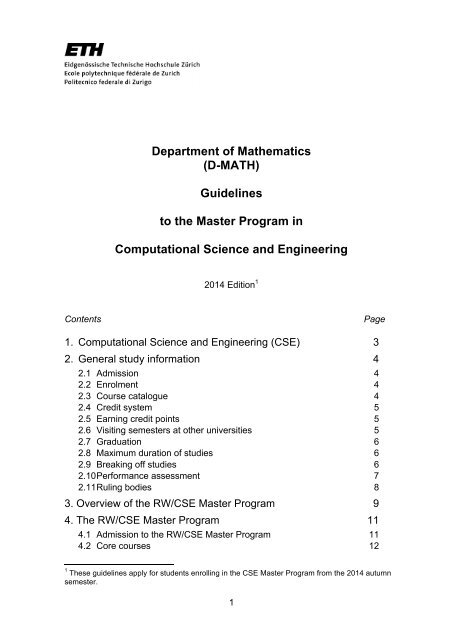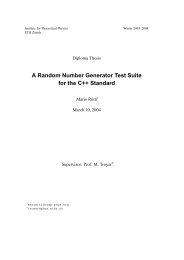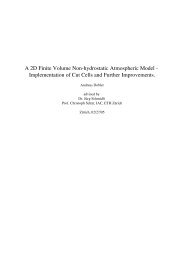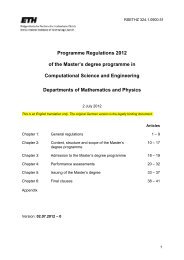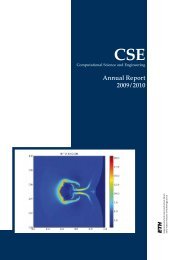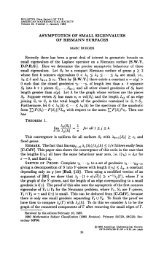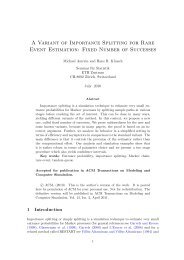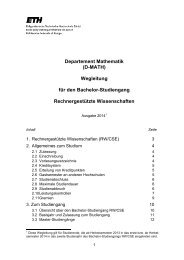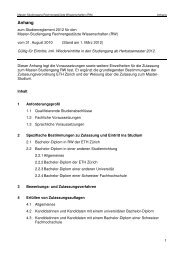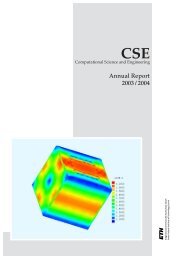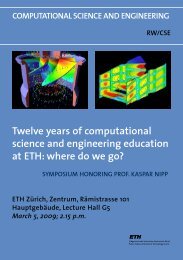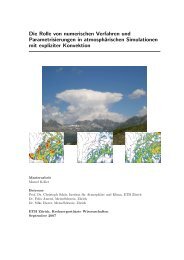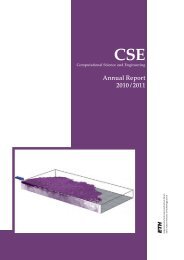Departments of Mathematics and Physics (D-MATH/D ... - RW/CSE
Departments of Mathematics and Physics (D-MATH/D ... - RW/CSE
Departments of Mathematics and Physics (D-MATH/D ... - RW/CSE
Create successful ePaper yourself
Turn your PDF publications into a flip-book with our unique Google optimized e-Paper software.
Department <strong>of</strong> <strong>Mathematics</strong>(D-<strong>MATH</strong>)Guidelinesto the Master Program inComputational Science <strong>and</strong> Engineering2014 Edition 1ContentsPage1. Computational Science <strong>and</strong> Engineering (<strong>CSE</strong>) 32. General study information 42.1 Admission 42.2 Enrolment 42.3 Course catalogue 42.4 Credit system 52.5 Earning credit points 52.6 Visiting semesters at other universities 52.7 Graduation 62.8 Maximum duration <strong>of</strong> studies 62.9 Breaking <strong>of</strong>f studies 62.10 Performance assessment 72.11 Ruling bodies 83. Overview <strong>of</strong> the <strong>RW</strong>/<strong>CSE</strong> Master Program 94. The <strong>RW</strong>/<strong>CSE</strong> Master Program 114.1 Admission to the <strong>RW</strong>/<strong>CSE</strong> Master Program 114.2 Core courses 121 These guidelines apply for students enrolling in the <strong>CSE</strong> Master Program from the 2014 autumnsemester.1
In case <strong>of</strong> exam: Conditions <strong>of</strong> admission >Date (session?) > Weight <strong>of</strong> grade >Mode (written/oral?) > Duration >Exam aids permitted > Examiner (if not lecturer)2.4 Credit systemThe study program uses a credit system which corresponds to the European CreditTransfer System (ECTS). The credit points (KP) awarded for each defined studyachievement reflect the average real amount <strong>of</strong> work required to attain thisachievement. One credit point is roughly equivalent to 30 hours <strong>of</strong> work. The entireamount <strong>of</strong> work required per semester for full-time studies is equivalent to 30 KPon average. The <strong>RW</strong>/<strong>CSE</strong> Master Program is designed to cover 3 semesters (2semesters plus a subsequent Master thesis) during which students need to acquire90 credit points in total.2.5 Earning credit pointsThe credit points assigned to a course are awarded either in full or not at all. Theyare awarded if the performance assessment defined for the course in question hasbeen passed. If grades are awarded for the performance assessment, the gradeachieved must be at least 4.0.All courses are evaluated independently, <strong>and</strong> a student is required to repeat onlythose performance assessments or courses for which he or she did not pass theperformance assessment the first time.Administration <strong>of</strong> credit points is carried out by the Study Administration Office D-<strong>MATH</strong>.2.6 Visiting semesters at other universitiesIn the Master Program any number <strong>of</strong> KP can be earned at another university.However, only a maximum <strong>of</strong> 30 such KP can be used for earning the Master degree;any remaining KP will be listed on a separate sheet attached to the graduationcertificate at the student's request.Before they begin visiting semesters at other universities, students must draw up awritten study plan in collaboration with the Fachberater <strong>RW</strong> (Advisor <strong>of</strong> Studies<strong>CSE</strong>). This plan shows the study achievements that the student expects to attainat the host university. The study plan must be approved by the Director <strong>of</strong> Studies<strong>CSE</strong>.Further information about visiting semesters (administrative matters, stipends,etc.) can be obtained from the Advisor <strong>of</strong> Studies <strong>CSE</strong> <strong>and</strong> the Mobilitätsstelle desRektorats (Student Exchange Office <strong>of</strong> the Rectorate).5
2.11 Ruling bodiesDecisions affecting the <strong>RW</strong>/<strong>CSE</strong> curricula are the responsibility <strong>of</strong> the Rectorate,the <strong>CSE</strong> Committee (Ausschuss <strong>RW</strong>), the Director <strong>of</strong> Studies <strong>CSE</strong> (Studiendelegierter<strong>RW</strong>) <strong>and</strong> the Advisor <strong>of</strong> Studies <strong>CSE</strong> (Fachberater <strong>RW</strong>), the DepartementConference D-<strong>MATH</strong>, the Students/Teachers Commission <strong>CSE</strong> (Unterrichtskommission<strong>RW</strong>.The Study Administration Office D-<strong>MATH</strong> is responsible for administrative matters.For addresses see Chapter 7.Ø The students elect representatives to the Students/Teachers Commission <strong>and</strong>other ruling bodies; these representatives participate <strong>and</strong> have voting rights.8
3. Overview <strong>of</strong> the <strong>RW</strong>/<strong>CSE</strong> Master ProgramThe <strong>RW</strong>/<strong>CSE</strong> Master Program <strong>of</strong>fered by D-<strong>MATH</strong> requires 1½ years <strong>of</strong> study 3 (2semesters followed by five months to write a Master thesis). The 90 credit pointsrequired for a Master degree are earned in m<strong>and</strong>atory core courses, in electivecourses <strong>and</strong> fields <strong>of</strong> specialisation chosen by the students, as well as in a termpaper <strong>and</strong> a Master thesis.The Master Program in <strong>RW</strong>/<strong>CSE</strong>Study period 1st/2nd semester Master thesisCredit points 60 30(minimum number, Core courses 12 5 monthswithout GESS) Fields <strong>of</strong> specialisation 18Elective courses 6Case studies 6Term paper 8Master degree:(German:Master <strong>of</strong> Science ETH in Computational Science <strong>and</strong> EngineeringAbbreviated title: MSc ETH <strong>CSE</strong>Master <strong>of</strong> Science ETH in Rechnergestützten WissenschaftenAbbreviated title: MSc ETH <strong>RW</strong>)The core courses are <strong>of</strong> central importance in computational science <strong>and</strong> engineering.List <strong>of</strong> core courses:• Visual Computing• Computational Statistics• How To Write Fast Numerical CodeThe fields <strong>of</strong> specialisation provide deeper underst<strong>and</strong>ing <strong>of</strong> the areas <strong>of</strong> applicationin computational science <strong>and</strong> engineering.List <strong>of</strong> fields <strong>of</strong> specialisation:• Astrophysics• <strong>Physics</strong> <strong>of</strong> the Atmosphere• Chemistry• Fluid Dynamics• Control Theory• Robotics• <strong>Physics</strong>• Computational Finance3 Up to 2 years if an additional 30 KP (maximum) need to be earned subject to specified admissionrequirements9
• Electromagnetics• Geophysics• BiologyThe elective courses provide students with more extensive <strong>and</strong> more in-depthknowledge <strong>of</strong> theory <strong>and</strong> methods.In the case studies seminar internal ETH <strong>and</strong> external speakers present examplesfrom their own fields <strong>of</strong> application – from modelling to computer-based problemsolving. Students have to give a short presentation on some scientific paper.The term paper (Semesterarbeit) enables students to deepen their knowledge <strong>of</strong>a certain field, to come into closer contact with applications, <strong>and</strong> to tackle the problemsarising from such applications using computers. In addition, the purpose <strong>of</strong>term papers is to teach students to collaborate with an existing scientific group.The subject for the term paper is usually taken from a core course or from a field<strong>of</strong> specialisation.The Master thesis is the conclusion <strong>of</strong> the program. Its purpose is to allow studentsto demonstrate their ability to carry out scientific work in an independent <strong>and</strong>structured manner. The subject for the Master thesis is usually taken from a corecourse or from a field <strong>of</strong> specialisation.The <strong>RW</strong>/<strong>CSE</strong> Master Program follows on from the <strong>RW</strong>/<strong>CSE</strong> Bachelor Program <strong>of</strong>feredby ETH. Its objective is to make new, computer-based career pr<strong>of</strong>iles accessibleto students. The interdisciplinary training in mathematics, computer science<strong>and</strong> applications is excellent preparation for a career in business <strong>and</strong> industry.10
4. The <strong>RW</strong>/<strong>CSE</strong> Master Program4.1 Admission to the <strong>RW</strong>/<strong>CSE</strong> Master ProgramAdmission requirementsIndividuals requesting admission to the <strong>RW</strong>/<strong>CSE</strong> Master Program will generallyhave to meet the following requirements:a. They have a <strong>RW</strong>/<strong>CSE</strong> Bachelor degree from D-<strong>MATH</strong>.b. They have a Bachelor degree comprising at least 180 credit points(ECTS) from a university or from a Swiss university <strong>of</strong> applied science,or a university qualification <strong>of</strong> at least equivalent value in a subject whichqualifies them for admission to the <strong>RW</strong>/<strong>CSE</strong> Master Program. The subjectbackground required (Requirement Pr<strong>of</strong>ile) is detailed in the appendixto the Study Regulations 2005 for the <strong>RW</strong>/<strong>CSE</strong> Master Program.Moreover, they must demonstrate that their knowledge <strong>of</strong> the teachinglanguage –English – is adequate.The Rector decides on exceptions based on the recommendation <strong>of</strong> the Director <strong>of</strong>Studies <strong>CSE</strong>.Admission procedure<strong>RW</strong>/<strong>CSE</strong> Bachelor students from D-<strong>MATH</strong> can enrol directly in the <strong>RW</strong>/<strong>CSE</strong> MasterProgram provided they need to acquire no more than 30 credit points to gain aBachelor degree. The dates <strong>and</strong> deadlines for enrolment apply as issued by ETH.Admission is conditional on the student gaining the Bachelor degree. The right <strong>of</strong>admission lapses if the student does not gain the Bachelor degree or cannot gainit because he or she has failed performance assessments or has exceeded themaximum permitted study duration for the Bachelor Program. The Rector decideson exceptions based on the recommendation <strong>of</strong> the Director <strong>of</strong> Studies <strong>CSE</strong>.All other c<strong>and</strong>idates must apply for admission to the <strong>RW</strong>/<strong>CSE</strong> Master Program atthe ETH Zürich Rectorate. The application may be registered before the requiredacademic degree has been earned. The procedure for this is determined by theRector. The <strong>CSE</strong> Admissions Committee (Zulassungsauschuss <strong>RW</strong>) assesses thec<strong>and</strong>idates' knowledge level in the relevant subjects <strong>and</strong> their suitability for theMaster Program. It then formulates a recommendation for admission or nonadmissionwhich is submitted to the ETH Admissions Office, together with informationon credit points acquired <strong>and</strong> those still to be earned. The Rector decides,based on the recommendation <strong>of</strong> the <strong>CSE</strong> Admissions Committee, on admissionor non-admission, as well as on the number <strong>of</strong> credit points acknowledged <strong>and</strong>those still to be earned. The student may not join the Master Program until the requireduniversity degree or certificates <strong>of</strong> achievement have been acquired.11
Important links for students from outside ETH:Master studies at ETH Zurich: www.ethz.ch/prospectives/masterAdmissions <strong>of</strong>fice: www.rektorat.ethz.ch/about/student_admin/admissions_<strong>of</strong>ficeRefusal <strong>of</strong> admissionC<strong>and</strong>idates with a university degree will not be admitted to the <strong>RW</strong>/<strong>CSE</strong> MasterProgram if they still need to complete studies accounting for more than 30 creditpoints to qualify for admission. These c<strong>and</strong>idates may apply for admission to the<strong>RW</strong>/<strong>CSE</strong> Bachelor Program. The details <strong>of</strong> the admission procedure are regulatedin the Rules on Admission to Studies at ETH (Zulassungsverordnung ETHZ).4.2 Core coursesThe core courses are courses 4 which are <strong>of</strong> central importance in computationalscience <strong>and</strong> engineering.The core courses:Course SWS Sem. D- KPVisual Computing 4V 3U HS INFK/<strong>RW</strong> 8Computational Statistics 3V 2U FS <strong>MATH</strong>/<strong>RW</strong> 10How To Write Fast Numerical Code 3V 2U FS INFK/<strong>RW</strong> 6Two core courses out <strong>of</strong> three must be attended <strong>and</strong> examinations must be takenin both.Ø The information in these tables may no longer be up to date. Students are advisedto refer to the course catalogue (www.vvz.ethz.ch) published on the Internet.Ø The students are advised to attend the core courses at the beginning <strong>of</strong> theirMaster studies.4.3 Fields <strong>of</strong> specialisationThe fields <strong>of</strong> specialisation provide in-depth knowledge <strong>of</strong> applications in computationalscience <strong>and</strong> engineering.4 Key to the tables in these guidelines:SWS Number <strong>of</strong> hours per week during semestersSem. Semester in which the course is held (HS: autumn semester; FS: spring semester)D- Main department for which the course is <strong>of</strong>feredKP Number <strong>of</strong> credit pointsV Lectures (number <strong>of</strong> hours)U Exercise classes (number <strong>of</strong> hours)G Lectures <strong>and</strong>/or exercise classes (number <strong>of</strong> hours)O M<strong>and</strong>atory courseE Recommended course12
Five courses must be attended in the category "Fields <strong>of</strong> specialisation", one <strong>of</strong>them a seminar. In the seminar a semester project must be completed. In the othercourses exams have to be taken <strong>and</strong> passed.Students who did not go through the D-<strong>MATH</strong> <strong>RW</strong>/<strong>CSE</strong> Bachelor Program have totake the five courses in the same field <strong>of</strong> specialisation ("major specialisation") 5 .Students who have completed the D-<strong>MATH</strong> <strong>RW</strong>/<strong>CSE</strong> Bachelor Program canchoose between two options:a. The five courses, including the seminar, belong to the same field <strong>of</strong> specialisation– one which the student did not study in the <strong>RW</strong>/<strong>CSE</strong> BachelorProgram ("major specialisation") 5 .b. Three courses, including the seminar, come from the field <strong>of</strong> specialisationthat the student studied in the <strong>RW</strong>/<strong>CSE</strong> Bachelor Program ("majorspecialisation") 5 ; two courses come from a different field <strong>of</strong> specialisation("minor specialisation") 5 .Ø Students on the <strong>RW</strong>/<strong>CSE</strong> Bachelor Program must select a "minor specialisation"5 (two courses). This can be exp<strong>and</strong>ed into a "major specialisation" 5 (fourcourses <strong>and</strong> one seminar) on the <strong>RW</strong>/<strong>CSE</strong> Master Program; alternatively, thestudent may choose a new "major specialisation" on the <strong>RW</strong>/<strong>CSE</strong> Master Program.Ø The following applies to students who have already attended courses in thefields <strong>of</strong> specialisation <strong>and</strong> sat the associated exams as part <strong>of</strong> the <strong>RW</strong>/<strong>CSE</strong>Bachelor Program:• Students who have failed an exam once can only re-sit the exam forthe corresponding course once on the <strong>RW</strong>/<strong>CSE</strong> Master Program.• Students who have failed an exam twice cannot take the correspondingcourse on the <strong>RW</strong>/<strong>CSE</strong> Master Program.• Students who have passed an exam but have not put the KP earnedin the process towards their Bachelor degree can use these KP toacquire the Master degree by having them credited to the category"Fields <strong>of</strong> specialisation" or the category "Elective courses".Ø In justified exceptional cases, the Director <strong>of</strong> Studies <strong>CSE</strong> may, at the student'srequest, approve attendance <strong>of</strong> courses other than those available in the fields<strong>of</strong> specialisation.5 All fields <strong>of</strong> specialisation are eligible for a “minor specialisation” but only those in the list belowlabelled as major are eligible for a “major specialisation”.13
The fields <strong>of</strong> specialisationa. Astrophysics (minor)b. <strong>Physics</strong> <strong>of</strong> the Atmosphere (major)c. Chemistry (major)d. Fluid Dynamics (major)e Systems <strong>and</strong> Control (major)f. Robotics (major)g. <strong>Physics</strong> (major)h. Computational Finance (major)i. Electromagnetics (major)k. Geophysics (minor)l. Biology (minor)Courses in the fields <strong>of</strong> specialisationa. Astrophysics (Contact: Mayer L., Astrophysics, Zurich University)Course SWS Sem. D- KPTheoretical Astrophysics 4V 2U HS PHYS 10Theoretical Astrophysics <strong>and</strong>Cosmology 4V 2U FS PHYS 10b. <strong>Physics</strong> <strong>of</strong> the Atmosphere (Contact: Schär Ch., D-USYS)Course SWS Sem. D- KPAtmosphäre 2V HS USYS 3Numerical Modelling <strong>of</strong>Weather <strong>and</strong> Climate 3G FS USYS 4Boundary Layer Meteorology 3G HS ERDW 4Dynamics <strong>of</strong> Large-ScaleAtmospheric Flow 2V 1U HS USYS 4Atmospheric General CirculationDynamics 3G FS ERDW 4Seminar in <strong>Physics</strong> <strong>of</strong> the Atmosphere for <strong>CSE</strong> HS/FS <strong>RW</strong> 4c. Chemistry (Contact: Hünenberger P., D-CHAB)Course SWS Sem. D- KPComputer Simulation in Chemistry,Biology <strong>and</strong> <strong>Physics</strong> 3G HS CHAB 7Quantenchemie 3G FS CHAB 6Computational Biology 3V 2U HS INFK 6Computer Applications: FiniteElements in Solids <strong>and</strong> Structures 2V 2U FS MATL 4Advanced Quantum Chemistry 3G HS CHAB 7Seminar in Chemistry for <strong>CSE</strong> HS/FS <strong>RW</strong> 414
d. Fluid Dynamics (Contact: Jenny P., D-MAVT)Course SWS Sem. D- KP *Fluid Dynamics II 2V 1U HS MAVT 3 OWTurbulent Flows 2V 1U HS MAVT 4 OWAdvanced CFD Methods 2V 1U FS MAVT 4 OBerechnungsmethoden derEnergie- und Verfahrenstechnik 2V 2U FS MAVT 4Compressible Flows 2V 1U FS MAVT 4Quantitative Flow Visualisation 2V 1U HS MAVT 4Turbulence Modeling 2V 1U FS MAVT 4Fluid Dynamics with the LatticeBoltzmann Method 3G HS MAVT 4Theory <strong>and</strong> Modeling <strong>of</strong> Reactive Flows 3G HS MAVT 4Seminar in Fluid Dynamics for <strong>CSE</strong> HS/FS <strong>RW</strong> 4Ø OW: One <strong>of</strong> the two courses is m<strong>and</strong>atory; Fluid Dynamics II is recommendedfor German speaking students.e. Systems <strong>and</strong> Control (Contact: Lygeros J., D-ITET)Course SWS Sem. D- KPRegelsysteme 2V 2U HS ITET 6Control Systems II 4G FS ITET 6Signal- und Systemtheorie I 2V 1U HS ITET 4Signal und Systemtheorie II 2V 2U FS ITET 4Linear System Theory 5G HS ITET 6Stochastic Systems 2V 1U FS ITET 4Signals <strong>and</strong> Systems 4G HS ITET 4Dynamic Programming <strong>and</strong>Optimal Control 3G HS ITET 4Nonlinear Systems <strong>and</strong> Control 4G FS ITET 6Seminar in Systems <strong>and</strong> Control for <strong>CSE</strong> HS/FS <strong>RW</strong> 4f. Robotics (Contact: Buchli J., D-MAVT)Course SWS Sem. D- KP *Theory <strong>of</strong> Robotics <strong>and</strong> Mechatronics 3G HS MAVT 4 OAutonomous Mobile Robots 4G FS MAVT 5 OMachine Learning 3V 2U HS INFK 6Image Analysis <strong>and</strong> Computer Vision I 3V 1U HS ITET 6Dynamic Programming <strong>and</strong> OptimalControl 3G HS MAVT 4Recursive Estimation 2V 1U FS MAVT 4Seminar in Robotics for <strong>CSE</strong> HS/FS <strong>RW</strong> 415
Lithosphere 2G FS ERDW 34) Modelling for Applied Geophysics &Inverse Theory for Applied Geophysics 2G 2V FS ERDW 65) Seismic Tomography 2G HS ERDW 36) Seismology <strong>of</strong> the Spherical Earth 2G FS ERDW 3Ø Recommended combinations: 1)+2); 1)+3); 2)+3); 3)+4); 5)+6); 5)+4).l. Biology (Contact: Stelling J., D-BSSE)Course SWS Sem. D- KPComputational Systems Biology 3V 2U HS BSSE/<strong>RW</strong> 6Statistical Models in ComputationalBiology 2V 1U FS BSSE/<strong>RW</strong> 5Spatio-Temporal Modelling in Biology 3G FS BSSE/<strong>RW</strong> 5Ø The information in these tables may no longer be up to date. Students are advisedto refer to the course catalogue (www.vvz.ethz.ch) published on the internet.Ø Fields <strong>of</strong> specialisation without a seminar may only be selected as a "minorspecialisation".4.4 Elective coursesElective courses provide students with more extensive <strong>and</strong> more in-depthknowledge <strong>of</strong> theory <strong>and</strong> methods.Students must take at least two elective courses <strong>and</strong> sit exams in these subjects.The courses from which students may select are listed in the published coursecatalogue (www.vvz.ethz.ch). Courses in the fields <strong>of</strong> specialisation may also bechosen as elective courses provided that they are not already part <strong>of</strong> the student'schosen fields <strong>of</strong> specialisation. The Director <strong>of</strong> Studies <strong>CSE</strong> may approve additionalelective courses on request.Ø The following applies to students who have already sat exams in electivecourses as part <strong>of</strong> the <strong>RW</strong>/<strong>CSE</strong> Bachelor Program:• Students who have failed an exam once can only re-sit the exam forthe corresponding course once on the <strong>RW</strong>/<strong>CSE</strong> Master Program.• Students who have failed an exam twice cannot attend the correspondingcourse on the <strong>RW</strong>/<strong>CSE</strong> Master Program.• Students who have passed an exam but have not put the KP earnedin the process towards their Bachelor degree can use these KP toacquire the Master degree.17
4.5 Case studiesIn the case studies seminar internal ETH <strong>and</strong> external speakers present examplesfrom their own fields <strong>of</strong> application – from modelling to computer-based problemsolving. Students have to give a short presentation on some scientific paper. Onecourse per semester is <strong>of</strong>fered.The case studies seminar is assessed as passed/not passed <strong>and</strong> is equivalent to3 KP.Students must attend the case studies seminar twice. The Director <strong>of</strong> Studies <strong>CSE</strong>may approve exceptions for students on an exchange program.4.6 Term paperThe purpose <strong>of</strong> the term paper (Semesterarbeit) is to deepen knowledge in a certainsubject, to bring students into closer contact with applications, <strong>and</strong> to enablestudents to take a computational approach to problems encountered in these applications.In addition, students will learn to collaborate in an existing scientificgroup. The term paper is written on a subject from a core course or a field <strong>of</strong> specialisation<strong>and</strong> is supervised by a lecturer. For the list <strong>of</strong> eligible lecturers seewww.rw.ethz.ch/master. The Director <strong>of</strong> Studies <strong>CSE</strong> may approve exceptions.The term paper requires approximately 160 hours <strong>of</strong> work. This is equivalent toabout three afternoons <strong>of</strong> four hours each per semester week or four to five weeks<strong>of</strong> full-time work.The supervisor responsible for the term paper defines the task <strong>and</strong> determines thestart <strong>and</strong> the submission date.The term paper concludes with a written report <strong>and</strong> a presentation. It is assessedas passed/not passed <strong>and</strong> earns the student 8 KP.Ø Once students have decided which lecturer to work with for their term paper,they have to electronically fill in a form for the Study Administration Office D-<strong>MATH</strong>.4.7 GESSStudents must attend courses <strong>of</strong> a general educational nature from the humanities,social sciences <strong>and</strong> political sciences (GESS); required attendance is 1 KPper semester (1st <strong>and</strong> 2nd semester). For more detailed information seewww.gess.ethz.ch.19
4.8 Master thesisThe Master thesis concludes the curriculum. In their Master thesis, studentsshould demonstrate their ability to carry out independent, structured scientificwork.To be admitted to the Master thesis students have to have fulfilled the followingrequirements: They have completed their Bachelor studies in full; they have compliedwith any requirements for admission to the <strong>RW</strong>/<strong>CSE</strong> Master Program; theyhave passed all performance assessments in the categories “Core courses”,“Fields <strong>of</strong> specialisation” (with seminar), “Term paper” (cf. Subsections 4.9 <strong>and</strong>5.1).The Master thesis is supervised by a pr<strong>of</strong>essor <strong>of</strong> ETH Zürich. For the list <strong>of</strong> eligiblelecturers see www.rw.ethz.ch/master. The Director <strong>of</strong> Studies <strong>CSE</strong> may approveexceptions. The thesis lasts five months. It is typically written on a subjectfrom a core course or a field <strong>of</strong> specialisation.The supervisor responsible for the Master thesis defines the task, the start <strong>and</strong> thesubmission date.The Master Thesis concludes with a written report. The Master thesis is graded. Itis equivalent to 30 KP.Ø Once students have decided which pr<strong>of</strong>essor to work with for their Master thesis,they have to electronically fill in a form for the Study Administration OfficeD-<strong>MATH</strong>.4.9 Performance assessmentA student has passed a performance assessment in the categories “Core courses”,“Fields <strong>of</strong> specialisation” (without seminar), “Elective courses” <strong>and</strong> “GESS” ifhis or her grade is at least 4.0 or his/her performance is assessed as "passed". Aperformance assessment which is not passed can be repeated once.A semester project in the category “Case studies” which is not passed cannot berepeated. The student must attend a further course in the category “Case studies”.A seminar in the field <strong>of</strong> specialisation or a term paper which has not been passedcannot be repeated. A further seminar must be attended, or a further term papermust be written.The Master thesis is passed if the grade achieved is at least 4.0. A Master thesiswhich is not passed can be repeated once. If it is repeated, a new topic must beselected.20
5. The <strong>RW</strong>/<strong>CSE</strong> Master degree5.1 Credit pointsIn order to attain the <strong>CSE</strong> Master degree, students must acquire 90 KP 6 in the followingcategories, including at least the number <strong>of</strong> KP shown for each category:a. Main areas 44 KP1) Core Courses (12 KP)2) Fields <strong>of</strong> specialisation (18 KP)3) Elective courses (6 KP)b. Case studies 6 KPc. Term paper 8 KPd. GESS 2 KPe. Master thesis 30 KPØ The minimum number <strong>of</strong> KP required in the category a. is 36. If there are stillKP missing to 44 KP after having earned the KP in the subcategories 1), 2), 3)the missing KP have to be acquired in the subcategory 3).Ø KP from courses <strong>of</strong>fered on both the Bachelor <strong>and</strong> the Master Program can onlybe credited towards the Master degree if they have not been used to earnthe Bachelor degree.5.2 GraduationOnce the requirements listed in Section 5.1 have been fulfilled, students may applyto D-<strong>MATH</strong> to graduate within the maximum permitted duration <strong>of</strong> study. TheRector can extend this time limit on application if there are sufficient reasons.The application to graduate must list the performance achieved in the categoriesshown in 5.1 which the student wishes to have included in the graduation certificate.The sum <strong>of</strong> KP in each category must be at least equivalent to the minimumrequired in each.Other study achievements, not credited for the Master degree, will be listed on aseparate sheet attached to the graduation certificate at the student's request.6 Not including the KP (30 maximum) that may need to be earned subject to specific admission requirements21
5.3 Grades <strong>and</strong> grade point averageInterim grade certificates are issued at the end <strong>of</strong> each exam session <strong>and</strong> documentthe performance that has been achieved <strong>and</strong> evaluated since the last interimgrade certificate was issued.The graduation certificate contains the following:a. Grades <strong>and</strong> other assessments carried out in performance assessments <strong>and</strong>the grade average determined on the basis <strong>of</strong> these grades;b. On a separate sheet attached to the graduation certificate, a record <strong>of</strong> anycore courses that were not passed as well as <strong>of</strong> any other evaluations <strong>of</strong> performancethat were carried out.The grade average is calculated as a weighted average from the following grades:a. The two grades in the core courses weight for each: 2b. The four grades from the fields <strong>of</strong> specialisation weight for each: 1c. The grades from the elective courses weight for each: 1d. The grade for the Master thesis weight: 4Once the Master degree has been conferred, graduates receive a Degree Certificate<strong>and</strong> a Diploma Supplement. The Diploma Supplement is a document that isintended to facilitate <strong>and</strong> improve the evaluation <strong>and</strong> classification <strong>of</strong> the academicdegree for both study <strong>and</strong> career purposes. It contains a description <strong>of</strong> the curriculumthat has been studied <strong>and</strong> successfully concluded <strong>and</strong> a Qualification Pr<strong>of</strong>ile<strong>of</strong> the curriculum.The attainment <strong>of</strong> the Master degree is published by the Rectorate.22
6. Doctoral studiesETH <strong>of</strong>fers the opportunity to follow the Master Program with doctoral studies.Doctoral studies <strong>and</strong> the doctoral thesis introduce students to current research.Students require a Master degree from ETH or an equivalent degree from anotheruniversity in order to gain admission to doctoral studies. In special cases studentsmust sit an admission exam, the conditions <strong>of</strong> which are determined on an individualbasis. The most important requirement is that a pr<strong>of</strong>essor at ETH must be willingto supervise the doctoral thesis (Doctoral Thesis Supervisor).C<strong>and</strong>idates apply to the Rectorate in writing. The Rectorate determines the documentationwhich is required for enrolment <strong>and</strong> passes on the application, togetherwith its assessment, to the department designated by the supervisor <strong>of</strong> the doctoralthesis. The Doctoral Studies Committee (Doktoratsausschuss) reviews the application<strong>and</strong>, after consultation with the supervisor, formulates an application tothe relevant Head <strong>of</strong> Department. The Head then recommends to the Rector thatthe application be accepted or rejected.Doctoral c<strong>and</strong>idates produce a research plan in consultation with their supervisorwhich details the objectives <strong>and</strong> content <strong>of</strong> the doctoral thesis. The completion <strong>of</strong>the doctoral thesis should generally not take more than three to four years fromthe date <strong>of</strong> admission. The research plan is submitted to the Doctoral StudiesCommittee. An individual deadline is set for compliance with other admission conditions,<strong>and</strong> in general this should not be longer than one year. The Rectoratechecks whether the additional admission conditions have been met.Doctoral studies ensure that doctoral c<strong>and</strong>idates receive further education in thesubject on which they are writing their doctoral thesis <strong>and</strong> in other fields. Furthereducational activities are documented in the form <strong>of</strong> credit points (KP). KP are onlyawarded if the student can demonstrate independent achievement. Students arerequired to document the attainment <strong>of</strong> at least 12 KP. Students who completetheir doctoral thesis in less than three years are required to attain proportionallyfewer KP. Doctoral c<strong>and</strong>idates must attain at least one third <strong>of</strong> the KP that theyacquire in fields outside their own field <strong>of</strong> research.The Referee (usually the supervisor) <strong>and</strong> the Co-referee each produce a writtenopinion on the doctoral thesis <strong>and</strong> submit these to the Department prior to the doctoralexam. The doctoral exam consists <strong>of</strong> an oral exam lasting at least one hour inthe subject <strong>of</strong> the doctoral thesis. It is held by the examination committee. Thedoctoral exam is held no later than six years after enrolment in the doctoral studies.In exceptional cases the Rector can approve an extension based on the recommendation<strong>of</strong> the Department. The Examination Committee assesses both thedoctoral thesis <strong>and</strong> the oral exam as passed or not passed <strong>and</strong> reports its resultsto the Departmental Conference (Departementskonferenz) <strong>of</strong> the department inwhich the doctoral c<strong>and</strong>idate is enrolled. The Departemental Conference decides23
whether the doctoral title is to be awarded or refused on the basis <strong>of</strong> the ExaminationCommittee's report.The doctoral degree is issued on behalf <strong>of</strong> ETH <strong>and</strong> presented to the successfulc<strong>and</strong>idate during the first doctoral award ceremony held after the required number<strong>of</strong> copies <strong>of</strong> the thesis have been submitted. A fee is charged for the degree.Ø For more detailed information please refer to the Rules on Doctoral Studies atETH (Doktoratsverordnung der ETHZ).Ø In addition to carrying out research for their doctoral thesis <strong>and</strong> their doctoralstudies, doctoral c<strong>and</strong>idates usually also work as assistants <strong>and</strong> are thus involvedin teaching activities. Employment <strong>of</strong> this kind ensures a financial basisduring the doctoral period.Ø Graduates <strong>of</strong> the <strong>RW</strong>/<strong>CSE</strong> Program who wish to gain a doctoral qualification atETH do this in the department proposed by the Doctoral Thesis Supervisor.24
7. Relevant documents <strong>and</strong> addressesDocumentsThe following can be obtained from the Rectorate:a) Applicable to ETH in generalRules on admission to studies at ETH(Zulassungsverordnung ETHZ) 7Rules on performance assessment at ETH(AVL ETHZ) 7Rules on doctoral studies at ETH(Doktoratsverordnung ETHZ) 7b) For the <strong>RW</strong>/<strong>CSE</strong> curriculum 8Department <strong>of</strong> <strong>Mathematics</strong>, Study Regulations 2014 for the Master Programin Computational Science <strong>and</strong> EngineeringDepartment <strong>of</strong> <strong>Mathematics</strong>, Guidelines to the Master Program in ComputationalScience <strong>and</strong> EngineeringDepartement Mathematik, Studienreglement 2012 für den Bachelor-StudiengangRechnergestützte WissenschaftenDepartement Mathematik, Wegleitung für den Bachelor-Studiengang RechnergestützteWissenschaftenAddressesDirector <strong>of</strong> Studies <strong>CSE</strong>Advisor <strong>of</strong> Studies <strong>CSE</strong>Pr<strong>of</strong>. Dr. Ralf HiptmairDr. Vasile GradinaruSeminar for Applied <strong>Mathematics</strong>Seminar for Applied <strong>Mathematics</strong>ETH Zürich, HG G 58.2 ETH Zürich, HG GO 52.2CH-8092 ZürichCH-8092 ZürichTel.: ++41 (0) 44-63 23404 Tel.: ++41 (0) 44-63 23448E-mail: hiptmair@sam.math.ethz.ch E-mail:vasile.gradinaru@sam.math.ethz.chStudy Administration Office D-<strong>MATH</strong>Ms. Eva Künti / Ms. Sara Uberi / Ms. Marion AllemannStudy Administration Office D-<strong>MATH</strong>ETH Zürich, HG G 33.1CH-8092 ZürichTel.: ++41 (0) 44-63 24383E-mail: studiensekretariat@math.ethz.ch7 Can also be downloaded as a PDF file from www.rechtssammlung.ethz.ch under 'Lehre'8 Can also be downloaded as a PDF file from www.rw.ethz.ch/dokumente25
RectorateStudent Exchange OfficeETH Zürich, HG F19 ETH Zürich, HG F23.1Tel.: ++41 (0) 44-63 23000 Tel.: ++41 (0) 44-632 6161E-mail: kanzlei@rektorat.ethz.chwww.rektorat.ethz.chwww.mobilitaet.ethz.chInternetThe homepage <strong>of</strong> ETH (www.ethz.ch) provides general information about studyingat ETH, in particular the documents listed under a) above, <strong>and</strong> the course cataloguefor the <strong>RW</strong>/<strong>CSE</strong> Master Program (Vorlesungsverzeichnis):www.vvz.ethz.chDetailed information on the <strong>RW</strong>/<strong>CSE</strong> Master Program <strong>and</strong> the <strong>RW</strong>/<strong>CSE</strong> BachelorProgram can be found on the <strong>RW</strong>/<strong>CSE</strong> homepage: www.cse.ethz.chThe documents listed under b) above can be read on the <strong>RW</strong>/<strong>CSE</strong> homepage ordownloaded as PDF files.Other important websitesImportant links for students: www.ethz.ch/studentsETH Zürich Rectorate:www.rektorat.ethz.chEnrolment: www.rektorat.ethz.ch/applications/mystudiesETH Student Exchange Office: www.mobilitaet.ethz.chInternational student information: www.ethz.ch/prospectives/programmes26


